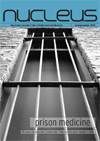The National Students' Conference is possibly my favourite weekend of the year; it fires me up to dedicate my medical career to God. Rachel McCollum writes about the way we were challenged to live differently as Christians in medical school on pp7,8. But I am often guilty of double-mindedness – forgetting that 'friendship with the world is hatred toward God' (Jas 4:4). I long to honour God in medicine, yet I harbour selfish ambition regarding my career.
In the past week, I had to decide whether or not to take a year out of medical school. As I searched my heart, I recognised the clash of two familiar motivations – wanting both God's glory and mine. A prestigious consultant job may be God's plan for some, but will our medical career become an idol? 'No one can serve two masters. Either he will hate the one and love the other, or he will be devoted to the one and despise the other' (Mt 6:24). Are we willing even to give up medicine if God so calls us?
Our allegiance to Christ can be tested in more subtle ways than that: 'All a man's ways seem innocent to him, but motives are weighed by the Lord' (Pr 16:2). TiJesunimi Abiola's article on Wisdom literature (pp40,41) explains how to apply Scripture, like the above proverb, in making godly decisions. While we have the responsibility to listen and obey, we must not agonise excessively over our decisions as a result of forgetting God's all sufficient grace!
The choices we make with regard to time can be revealing. How do we prioritise personal prayer and Sunday corporate worship compared to exam revision? Of course, we are called to work hard at our medical studies for God. But there are things we are uniquely positioned to do as Christian medics outside lecture theatres and wards. We can't leave these until we are qualified; the choices we make today shape those we make in the future. This issue of Nucleus explores some realistic possibilities.
My idea of a high flying career did not extend to prison work. But Robin Fisher writes about the difference Christian doctors can make to this needy population, both clinically and spiritually (pp30-34). Olivia Bush chose to understand these needs by working in a prison for her elective (pp35-38).
Electives are a fantastic opportunity for all of us and Peter Armon explains how they can give us insight into a different part of the world that God cares about, as well as providing valuable clinical experience (pp16-23). It is a chance to start caring about the nations of the world in the way that the Great Commission (Mt 28:19) demands!
The unborn child is an example of the vulnerable; Helen Barratt reminds us of their plight ahead of the 40th anniversary of the UK Abortion Act (pp4-6). The BMA is another arena where we can take a stand to make a real impact on society, as Anna Soar attests (pp 24-29). While it is right to preach the forgiveness of Christ fervently, we cannot shirk our equal call to speak out for the weak and voiceless who suffer injustice (Is 1:17).
































